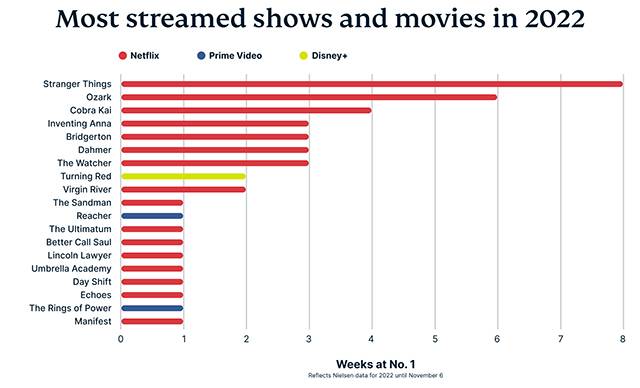Streaming trends in 2022

Netflix's business model has long since been based on getting people to binge-watch their favourite shows. This model has proved to be very successful, with the company having over 209 million subscribers worldwide. Streaming trends in 2022 continue to demonstrate the power of Netflix-original shows, such as Stranger Things and Dahmer. Both of which reached the #1 spot globally.
However, recent changes in the way people consume tv shows may mean that Netflix's binge model is no longer as effective as it once was.
TV viewing habits have changed dramatically in recent years, with people now watching shows in a more fragmented way. People are no longer watching TV shows in one sitting, but instead are spreading out their viewing over several days or even weeks.
This change in viewing could spell trouble for Netflix's binge model.
What Works
The streaming giant has completely changed the viewing experience, allowing viewers to watch an entire season of their favourite show in one sitting. Binge-watching is a great example of how technology and convenience can be used to enhance our enjoyment of the media.
The traditional model of television was that viewers would have to wait a week between episodes, leading to frustration if they wanted to see what happened next right away.
Netflix's binge model eliminates this by allowing people greater control over their viewing experience, as they can now choose when and how quickly they want to consume content, instead of being bound by television scheduling.
What Doesn't
A particular downside of the binge model is that the series loses its hype almost immediately after release. Since viewers can consume an entire season in a single day or weekend, there's no chance for anticipation or discussion throughout the weeks as new episodes arrive and previous episodes are talked about.
As a result, much of the Internet buzz around a show dies down right away, and by the time it's over, there's little left to talk about other than what kind of snack you had while There have been reports that the media giant is thinking of distancing itself from the model.
Unlike Wandavision or Euphoria, where Twitter blew up every week for months to discuss each episode, Stranger Things' hype eventually fizzled out despite its high viewership after a few weeks.
Now, What?
Streaming services are becoming increasingly popular and outpacing traditional television, with companies like Netflix, HBO, and Amazon Prime Video leading the way. These streaming giants have invested heavily in creating their original content which is proving to be more popular than ever before.
This shift in focus away from traditional TV networks has come largely due to the convenience of streaming services. These services also make it easy to organise your viewing preferences and curate personalised recommendations based on your interests.
Plus, they often don't require contracts or hidden fees like traditional cable companies do"making them an attractive option for those looking to save money while still enjoying quality entertainment.
The Bottom Line
Netflix has long been the go-to streaming service for binge watchers, but with stiff competition from rivals such as Amazon Prime Video and Hulu, Netflix needs to find other ways to remain competitive.
The streaming giant should consider moving away from its traditional binge model to maintain an edge over the competition. By offering a more varied selection of shows and films that can be watched on a weekly or monthly basis rather than all at once, Netflix could give viewers options that are more tailored to their preferences.
MORE





